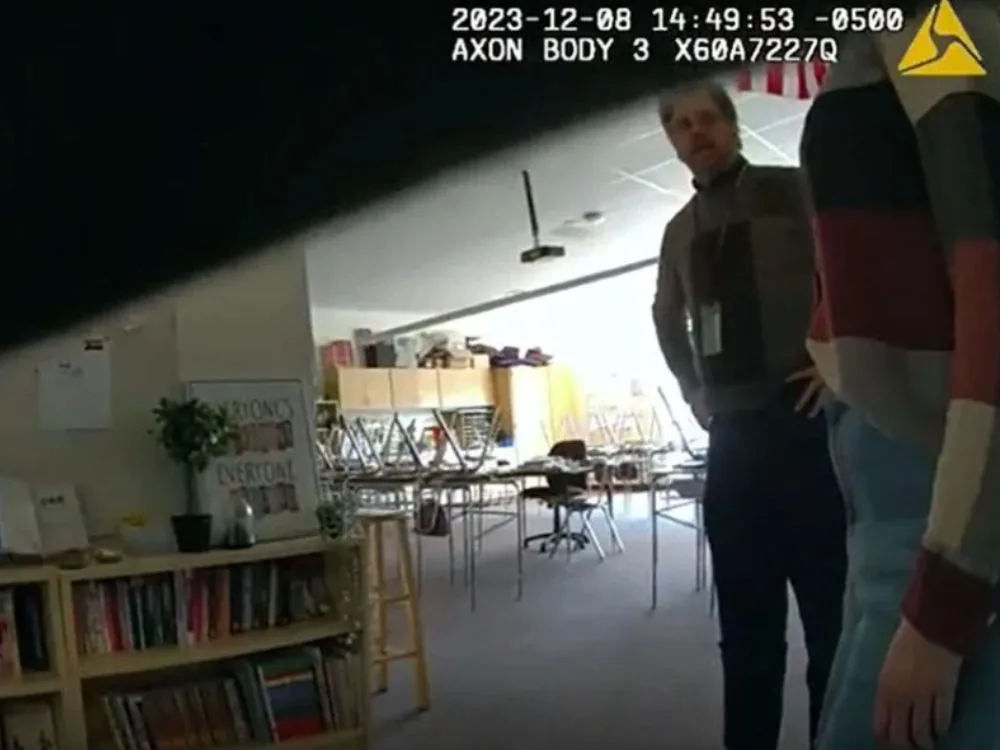On June 10th, Arantzazu Zuzene Galdos-Shapiro, a respected eighth-grade English teacher, resigned from her position at W.E.B. Du Bois Regional Middle School. In her resignation letter, Galdos-Shapiro bravely stated that she was leaving to protect her health, which had been gravely affected by the conditions and blatant violation of her rights at school.
She painfully realized that the district was no longer safe for her to continue her profession after a particular incident involving the school district and police. The teacher also filed a civil rights lawsuit in federal court against the district, the town, and the police for the December 8th incident in which a plain-clothed police officer who had no warrant entered her classroom after school, questioned her about the illustrated book Gender Queer: A Memoir, and allegedly searched for the book in her classroom, which he did not find. Gender Queer: A Memoir is not a banned book in the Berkshire Hills Regional School District in Massachusetts, though it is considered quite controversial throughout the country.
Gender Queer: A Memoir is a coming-of-age graphic novel that is recommended for ages 14 and up. The memoir is about Kobabe’s experience of coming out as nonbinary and has been at the center of debates over gender identity and what is appropriate for school libraries. The main arguments against the book are that it has sexually explicit content, including drawings of nude characters and sexual scenarios. The book was published in the middle of a time when the debate about gender identity and transgender rights is at the forefront of politics around the U.S.
The complaint against teacher Galdos-Shapiro initially came from a custodian at the school who made other unfounded accusations about the teacher. He has also been accused of being racist and homophobic and no longer works for the district. The claim led to police sending an officer out of uniform to her classroom to search for this book. What consequences there would have been if she had the book are unclear since it is not considered a banned book in the district. The teacher admitted that at one time, she had the book as part of her classroom library but never taught it or made reference to it in class.
Galdos-Shapiro’s federal lawsuit alleges that the town, school district, and police department violated her First, Fourth, Fifth, and Fourteenth Amendment rights as a result of the investigation and what subsequently happened to her. “Galdós-Shapiro, who serves as advisor to her school’s chapter of the nationally renowned Gender & Sexuality Alliance, alleges in her lawsuit that she was targeted for and subjected to an unwarranted and unlawful criminal investigation based upon an anonymous complaint from a school janitor known to Great Barrington officials to be a disgruntled employee following his being disciplined for homophobic and racist comments,” Cooper wrote in a press release announcing the civil rights lawsuit.

“She also alleges that Great Barrington officials knew well and failed to follow the established process for challenging classroom content, and she alleges that these unlawful actions were then followed by the defamatory disclosure by the Great Barrington Police of her name and personal information while linking her to a number of allegations already known to be false suggesting she had engaged in inappropriate activities with students. She alleges that because of the defendants’ unlawful actions, she has been threatened and suffered serious and substantial harm, which caused her to take a leave from her teaching responsibilities out of fear.”
The complaint and jury demand names the Berkshire Hills Regional School District, Superintendent of Schools Peter Dillon, Police Chief Paul Storti, and investigating Police Officer Joseph O’Brien.
“The written complaint filed with the court starts with the beginning of the investigation at the end of the school day on December 8, when Galdós-Shapiro finished teaching for the day when school Principal Miles Wheat approached her and directed her to accompany him to her classroom.
Once Galdós-Shapiro and the principal entered her classroom, another individual she would momentarily learn was a plainclothes Great Barrington Police Officer Defendant Joseph O’Brien, who followed the pair into her empty classroom. Although there was no reason to do so since students had left for the day and the hallway was empty, Officer O’Brien intentionally shut the classroom door behind him and placed himself between Galdós-Shapiro and the closed door, making it clear to her that she could not leave. Officer O’Brien then turned on his body camera and initiated an unlawful interrogation of Galdós-Shapiro and a search of her classroom.
Officer O’Brien’s body camera, which [he] partially obscured with his sweatshirt in violation of applicable policy, captured the audio of what happened next. The footage released by the Police Department shows that O’Brien did cover his bodycam, first with his hand, then with a sweatshirt.
Officer O’Brien made clear to Galdós-Shapiro that he was conducting a criminal investigation of her resulting from her possession of a book in her classroom because the book’s content was, according to him, obscene and illegal and could not be shown to students.
In the beginning of the bodycam video released by the Police Department, Officer O’Brien told Galdós-Shapiro, ‘It’s not the general idea of what the book is about. It’s that you can’t present that kind of material to people under 18.’”
“You’re welcome to remove it if you see it,” Galdós-Shapiro told Officer O’Brien. Galdós-Shapiro told Officer O’Brien that she did not know where the book was.
The lawsuit alleges that “It was not and is not obscene or illegal under any applicable legal standard, as was well-known to law enforcement or would have been known upon any meaningful inquiry. To the extent that anyone believed otherwise, no one had complained about the book by following the readily available and publicized procedure for challenging classroom content.”
Officer O’Brien had no lawful or proper basis to be in the classroom, interrogate Galdós-Shapiro, or conduct his search. But Officer O’Brien went further. During his coercive, custodial communications with Galdós-Shapiro, who could not locate the book in her classroom, he asserted that he had the right to search the entire school for the book. He went through the classroom looking at private materials belonging to students and ordered Galdós-Shapiro and the principal to provide the book to him as soon as it was located.

Adam Yorke, the custodian who made the complaints against the teacher, is not mentioned by name in the lawsuit but is identified by name in the school district’s report on the incident. Yorke recanted his claims during his interview for the school district’s independent investigation. As of February 15, he was no longer employed by the district.
So basically, the sole alleged and legally deficient ‘source’ for any complaint about the book or Galdós-Shapiro was a disgruntled school janitor, whose report was unreliable but as to which the Great Barrington Police Department, “decided to afford complete and ongoing acceptance and anonymity.” The complainant did not come close to presenting as a qualified or acceptable confidential source. These facts were readily available to the defendants before they undertook any steps at all before taking their unlawful actions.
According to the lawsuit, the defendants “continued with their unlawful and outrageous conduct” after the December 8 investigation. “They made public Galdós-Shapiro’s name, address, and date of birth in connection with the false allegations about her made by the complainant, allegations which they had already dismissed for lack of veracity. At the same time, they refused to disclose the complainant’s identity despite Galdós-Shapiro, faculty, and students being in fear, feeling threatened, and deeply worried about their safety at school. The District was fully complicit in these acts and omissions and only even requested the complainant’s name after Galdós-Shapiro demanded that they do so.”
The unwarranted criminal investigation and interrogation left Galdós-Shapiro, and the resulting —including the allegation that she was, essentially, a pedophile —left her devastated and profoundly shaken, ill, distressed, and fearful, her reputation publicly destroyed. Unable to return to the classroom and fearing that an unknown person or persons had falsely started the attack upon her which the defendants then carried out, Galdós-Shapiro was forced to take an extended leave of absence from her job.
Part of her resignation letter reads, “The Berkshire Hills School District is not a safe place for me to teach. I am in need of taking care of my health, which has greatly suffered as a result of these conditions and the violation of my rights. I do not believe my health will improve while daily living with the stressors continually imposed here, especially without hope for meaningful imminent change.”
Galdos-Shapiro does not ask for a monetary amount but compensatory and punitive damages, along with attorneys’ fees. Cooper also requests a jury trial. Neither Berkshire Hills Regional School District Chair Steve Bannon nor Police Chief Storti would comment on this story.

